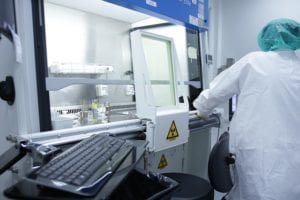
Gloria Karungi and Ronaldlee Ejalu are the parents of a 7-year-old daughter who has sickle cell anemia – a disease which, up until now has offered sufferers no hope of ever being healed. However, a new stem cell treatment involving bone marrow transplants, offers new hope to those who can find donors who are 100% matches. In many cases, this is rare, but a sibling is often the answer. Which is the heart of the dilemma that Karungi and Ejalu are facing.
The couple are separated and were never married, but Karungi wants to have another child with one of the 10 frozen embryos that she and Ejalu created while they were together. She wants the second child specifically to be a bone marrow donor for their first child. But now that the couple is parting ways, the argument of whether those embryos are children or property has become a highly contested one.
So which is it? Are they ‘children’, or are they ‘property’?
This is a tough topic, and one that could be argued pretty much forever, as the answer lies entirely in your perspective. Karungi’s attorney, Dan Marsh, recently presented an argument to the court stating that the embryos are human lives, and therefore they should be dealt with as part of a custody agreement. But Ejalu’s attorney, Daniel Weberman, disagrees.
According to Weberman, claiming that an embryo is equal to a human life is “contested science.” He has also questioned the ethical grey areas involved in “raising a child to harvest human tissue.” “What’s ironic and hypocritical,” Weberman says, “is that if we say, you know, we’re pro-life, then where is this child’s right to live their life? Really, the child doesn’t have a vote. They were born into this indentured servitude where they have to donate.”
An Oakland County Judge has to determine jurisdiction
The case came before Oakland County Circuit Judge Lisa Langton last year, when the former couple was trying to determine custody for their daughter. At that time, the Judge stated that she would handle the custody agreement for the daughter, but did not want to wade into the issue of embryo rights and ownership. However, after a ruling by the Appeals Court, the case has been sent back to Judge Langton.
Langton has said that she needs to determine if she even has jurisdiction before hearing any more evidence in this case. Assuming the Judge does have jurisdiction, she will allow the parties to submit evidence. She has also said that she will be issuing an opinion on Karungi’s request to assign a guardian to the embryos.
So what comes next? And how will it affect custody law in the future?
That’s a tricky question. In truth, we have no idea. Like everyone else watching this case, we’re waiting to see for ourselves. If the embryos are determined to be legally children in this case, and therefore subject to custody, this could have a huge impact on how similar cases are handled in the future. But then again, the Judge may decide they’re property that’s subject to the laws of asset division. As of now, no one knows.
At The Kronzek Firm, our skilled and experienced family law attorneys know that every child custody case is unique, and requires an understanding of Michigan’s highly nuanced family law. Failure to properly file a motion, for instance, might leave you with no recourse to file in the future. An attorney with little experience in handling child custody cases can make mistakes that can cost you your case, or your custody rights. At The Kronzek Firm, we’re very familiar with what’s required by law, and the many different options and possibilities available to you. Call 866 766 5245 today to talk to someone who can help.


